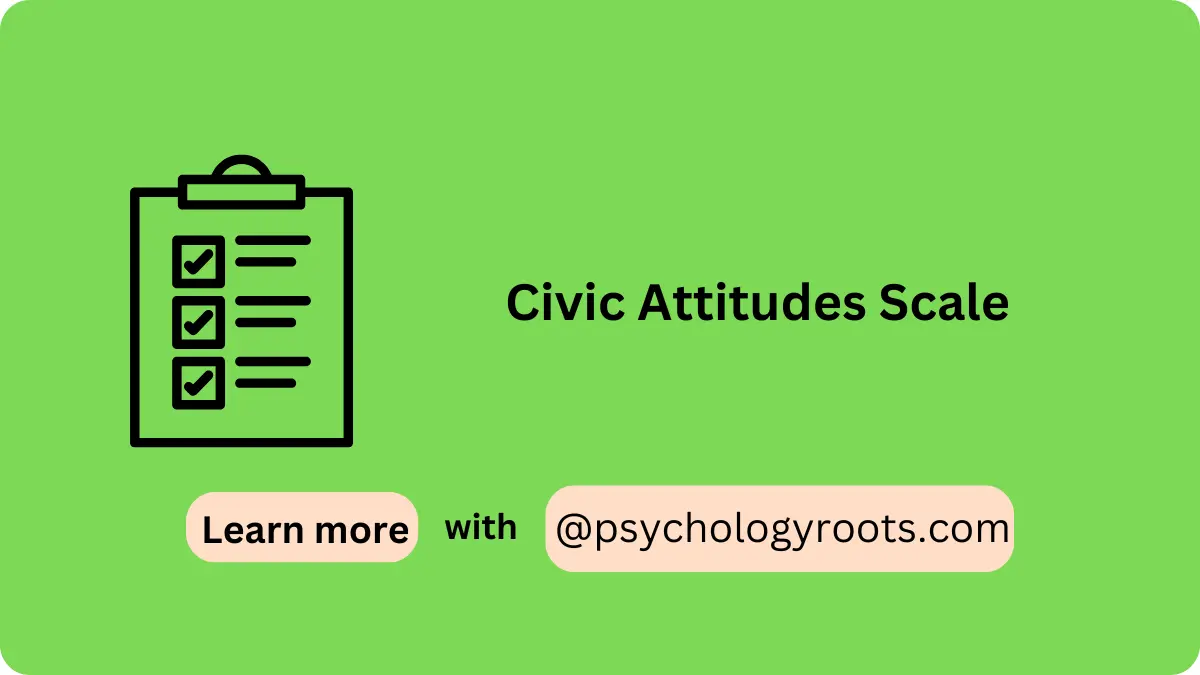Table of Contents
Civic Attitudes Scale
Here in this post, we are sharing the “Civic Attitudes Scale”. You can read psychometric and Author information. We have thousands of Scales and questionnaires in our collection (See Scales and Questionnaires). You can demand us any scale and questionnaires related to psychology through our community, and we will provide you with a short time. Keep visiting Psychology Roots.
About Civic Attitudes Scale
Scale Name
Civic Attitudes Scale
Author Details
Mabry
Translation Availability
English

Background/Description
The Civic Attitudes Scale is designed to measure attitudes toward civic responsibility and community engagement. This tool evaluates the willingness of individuals, particularly youth, to assume responsibility in helping others and addressing societal challenges. By exploring levels of civic-mindedness, the scale serves as a valuable resource for educators, program developers, and researchers interested in promoting civic engagement among adolescents.
With its straightforward structure and reliable scoring, the Civic Attitudes Scale provides insights into the mindset of youth regarding community service and societal contribution.
Administration, Scoring and Interpretation
- Target Population:
- Adolescents aged 12–17 years (Grades 6–12).
- Preparation:
Reliability and Validity
- Reliability: The scale demonstrates good internal consistency with an alpha score of .81.
- Validity: The scale has been validated in various studies assessing youth attitudes toward civic engagement, ensuring its reliability and applicability.
Available Versions
05-Items
Reference
Mabry, J. B. (1998). Pedagogical variations in service-learning and student outcomes: How time, contact, and reflection matter. Michigan journal of community service learning, 5(1), 32-47.
Important Link
Scale File:
Frequently Asked Questions
Q1: What does the Civic Attitudes Scale measure?
It measures attitudes related to civic responsibility and willingness to engage in community service.
Q2: Who is the target population for this scale?
The scale is designed for adolescents aged 12–17 years (Grades 6–12).
Q3: Are any items reverse-scored?
No, none of the items require reverse scoring.
Q4: How are the scores interpreted?
Higher scores indicate stronger civic attitudes and a greater willingness to participate in community service and address societal issues.
Q5: Is permission required to use this scale?
No, permission is not needed to use this scale.
Disclaimer
Please note that Psychology Roots does not have the right to grant permission for the use of any psychological scales or assessments listed on its website. To use any scale or assessment, you must obtain permission directly from the author or translator of the tool. Psychology Roots provides information about various tools and their administration procedures, but it is your responsibility to obtain proper permissions before using any scale or assessment. If you need further information about an author’s contact details, please submit a query to the Psychology Roots team.
Help Us Improve This Article
Have you discovered an inaccuracy? We put out great effort to give accurate and scientifically trustworthy information to our readers. Please notify us if you discover any typographical or grammatical errors.
Make a comment. We acknowledge and appreciate your efforts.
Share With Us
If you have any scale or any material related to psychology kindly share it with us at psychologyroots@gmail.com. We help others on behalf of you.